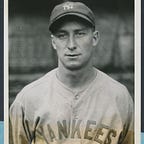Friday, May 13, 1927: St. Louis
Reading and Writing Ruth’s Mail
 Schoolboy Hoyt is not the only Yankee who reads Ruth’s mail.
Schoolboy Hoyt is not the only Yankee who reads Ruth’s mail.
Especially during a rain delay when we’re bored, or sometimes on the train, a bunch of us will sit around reading letters from the Babe’s mail bag.
It’s a tradition that goes back to Ruth’s first season on the Yankees in 1920, when he hit 54 home runs — more than 14 of the other 15 teams in the major leagues hit that year. That’s when he became America’s hero. That’s when the New York newspapers and the syndicated columnists started writing about him, every day. And that’s when America started writing to the Babe, every day.
Among Jidge’s hundreds of letters each week are requests for autographs and appearances, business proposals, romantic offerings and checks. Lots of checks, thanks to all his paid appearances and endorsements.
The Babe only opens the letters in the frilly or perfumed envelopes. The rest he leaves for us to read and pass around the locker room, and for our trainer, Doc Woods, to collect.
Doc operates the clubhouse post office, overseeing the ball boys who distribute the mail. Under Doc’s guidance, the ball boys also answer much of Ruth’s non-amorous fan mail for him, and they sign the Babe’s signature on most of his baseballs and pictures.
There’s not much turnover with the ball boys, but when there is, Doc makes the new boys practice the Babe’s signature for weeks until they get it right. For a ball boy, when Doc gives you the OK to sign Babe Ruth’s name, it’s like breaking into the starting lineup.
The most important rule of Doc Woods’s post office is that if an envelope looks like it could contain either a bill or a check, it’s put aside for Doc to give to for Christy Walsh, the Babe’s business manager.
Doc was telling us how this system came to pass the other night, while we were on the train to St. Louis. I was sitting in the back of the car with Mike Gazella, Benny and Doc, drinking suds that Hoyt had bought from Capone’s men in Chicago and had smuggled aboard the train in two steamer trunks marked “ART. FRAGILE.”
“Hell,” says Doc about Ruth’s mail. “Before Christy Walsh took over his business deals, Jidge didn’t even bother to open anything that didn’t look or smell like it came from a broad. In 1920, his first year with us, I went through a pile of unopened envelopes the Big Bam had tossed into a trash basket, simply because they didn’t smell sweet enough for him and…”
I start to laugh at the sight of Doc going through Babe’s trash, but Doc gives me a “Don’t interrupt my story” look that shuts me up, quick.
“So, one afternoon when Ruth’s out on the field at batting practice, I take that trash basket full of thrown-out mail into my office and I goes through all them envelopes. You know what I found in there?”
“An arrest warrant and a request for an income tax audit?” I ask.
“No, you smart-ass college boy.”
Doc looks over my shoulder and yells down to the other end of the car, “Hey, Sailor Bob! Get down here!” Shawkey, who’s in the process of bumming a cigarette off Herb Pennock, finishes his transaction and ambles down to us.
“What’s up?”
“Sailor, the first day I went through Ruth’s mail that he throwed away, you were with me …”
“Yup. One of the highlights of my career as a Yankee, somewhere between winning my first World Series game in ’23 and trying to help Myles here with his pitching motion.”
That stings a bit.
“Tell these boys what we found.”
“A lot of checks.”
“For how much?”
“Six thousand, four hundred, seventy two dollars and, as I recall, 60 cents.”
“Bullshit.” says Gazella. “You remember that exact number?”
“Look here, Gazook,” scolds Sailor Bob, “When you see some guy’s thrown out more money from just one mail drop than you make in a year — and twice as much as most of the guys in the league are making — you don’t forget the amount.
“And, Gazook?” continues Sailor Bob. “Do yourself a favor, and never tell me I’m bullshitting you again.”
Sailor heads back to the other end of the car to light up his smoke, but before he goes he winks at Mike with a smile that lets Gazook know that while Sailor’s serious, he’s not mad at Gazook. Just putting him in his place.
That moment between Shawkey and Gazella is part of the magic of Ruth. I’ve never seen anyone angry when they’re talking about the Babe — except for Miller Huggins. Hugg is the one person who has to try and manage both the myth and the man-child. And that part of his job is probably shortening Hugg’s life by a good five years, easy. And that’s no joke.
Huggins is also the only person on the Yankees since 1920 who hasn’t read Ruth’s mail.
Along with those notes from his female fans, the Babe makes sure to answer everything the postman brings from sick kids, their parents and doctors, poor kids and orphans. Everything.
Each ball boy is personally instructed by the Babe himself to be sure to get those letters to him.
Just the other day, the Babe received a gem.
 I am sitting at my locker, stewing a bit — wondering why Huggins hasn’t put me in any games in the week since my successful, belated season debut against the Senators back on May 4th — when a naked Babe with a cigar butt in his mouth comes over and asks, “Hey, Duck Eye, you speak any foreign languages?”
I am sitting at my locker, stewing a bit — wondering why Huggins hasn’t put me in any games in the week since my successful, belated season debut against the Senators back on May 4th — when a naked Babe with a cigar butt in his mouth comes over and asks, “Hey, Duck Eye, you speak any foreign languages?”
“No, Jidge,” I say, talking almost directly to his member, which is bobbing about two feet from my face. “Other than English, the only language I speak is the language of love.”
“Yeah? That’s awfully funny, keed — I was told that’s a foreign language to you. And your Buddy Bingo says you’ve been practicing it a lot when you’re alone in your room at night.” And with that, the Babe turns, farts triplets, and starts to head back to his locker. Then he spots Gehrig.
“Lou! There you are! I’ve been lookin’ all over for you. I need ya’.”
This is intriguing. So, despite being in the wake of Jidge’s odor, I walk over to listen in on their conversation.
“What’s up, Babe?”
“I got this letter and it’s written in German. I ‘sprechen Deutsch’ OK, but I’ve never been able to read the stuff.”
Ruth’s parents were both of German stock, and when he was a child, German was spoken around his house and in his neighborhood, maybe the roughest part of Baltimore. Even though he was only 7 when his parents dumped him in an orphanage, the Babe’s held onto much of the language — maybe it’s his way of hanging onto a part of his family, even if they didn’t want to hang onto him.
Ruth loves speaking German when he’s at Lou’s house for dinner every couple of weeks in New York. Lou’s first language was German, and it’s still the first language between him and his mother — he often writes portions of his daily letters home to her in German.
“Let me look at it for you, Babe,” say Lou.
Lou loves doing anything for the Babe. Right now, Gehrig’s hitting .396 — just behind Cobb — and he has seven home runs and 36 RBIs, compared to Ruth’s .330 with eight homers and 17 RBIs — but in their relationship, Gehrig is still like Ruth’s over-eager younger brother. Any time Babe asks Lou for help or his opinion, Lou feels privileged to be asked. But given Gehrig’s own greatness at the plate, which is astounding, I wonder how much longer that will continue.
Lou takes the letter from the Babe and starts to read it, with his high-pitched, thick New “Yawk” accent.
“This letter’s from a kid named Max Schmutterer, Babe. He lives in a town called Lochen, in Germany.
“Dear Mr. Babe Ruth, hero. You are my hero. I read about you in the newspapers. I read about how you become the most famous man in America by playing baseball, and how you now have much money and are very generous. I hope some day I become an athlete like you. My mother is a cook and cleaner for the houses of other people, and we are very poor. If I can become a big athlete like you, I will buy my mother a house only for herself, and lots of food and presents. Thank you, Mr. Babe Ruth, my hero.”
“That’s it, Babe,” says Lou.
My first thought is that the letter was probably written by some fat Kraut with a mustache pretending to be a kid, and hoping to shake $50 and an autograph out of Ruth. But that thought never crosses the Babe’s mind, nor Gehrig’s. Just mentioning a child to either one of them makes them go saccharine.
“Lou, let’s write him back!”
“Sure, Babe.”
Lou makes a quick round-trip over to Doc Woods for some paper and a pen.
“What do you want to say to him, Babe?”
“Dear Max,” Babe dictates, pacing back and forth in the nude, while Gehrig simultaneously translates and transcribes. “I got your letter and it means a lot to me that you wrote it.”
With that Ruth pauses both to think, and to fart.
“My own loving mother died when I was a very young boy. I don’t even remember much about her, and there’s not enough money in the world that will ever make up for her not being here with me. I miss her every day. You’re a lucky boy to still have your mom with you.
“Enclosed you’ll find …”
Ruth looks up. He arches his eyebrows, then quickly wheels around, reaches into his locker, pulls out his trousers and starts searching through his pockets. I can’t believe he’s going to send money to little Max.
$5? $50? $100?
With Ruth, any amount is possible.
Ruth pulls out a huge roll of cash, perhaps a thousand dollars and starts peeling back the bills.
“Hey, Meusel!” he yells across the locker room. Apparently, it was the sight of Silent Bob coming back into the room that motivated Ruth to check his pants pockets. From inside all the bills he pulls out a torn piece of paper.
“Here’s the name of that girl I told you was such a great lay at the Good Shepherd! You should call Miss Stella and tell her to put this girl aside for you tonight.”
Silent Bob comes over, takes the piece of paper with the name and nods his head in gratitude. Then he’s off to the payphone to call Miss Stella.
“Lou, where was I?” the nude dictator says to the greatest hitting stenographer of all time.
“Enclosed you’ll find…” reads back Miss Gehrig.
“Oh, yeah, right. Enclosed you’ll find an autographed picture with my very best wishes to you and your mom. Thanks for writing to me, Max. Your pal, Babe Ru — Oh! Wait! Lou, spell my last name R-E-U-T-H. That’s the German way, right?”
“Yeah, Babe. That’s right.”
“Yeah,” says Babe, “Little Max will love that. Let me take a look at it.”
The Babe takes Lou’s handwritten note and inspects his penmanship. “Wow,” the Babe says. “You sure do write pretty, Lou.”
How I wish little Max and Frau Schmutterer could be here in this locker room in St. Louis to experience all of this magic in person.
And if either of them has a mustache, I hope they’re not disappointed by the lack of cash.
“Miller Huggins’s Yankees”
Nobody liked Miller Huggins much his first half dozen years as manager, despite his winning three pennants in a row and one World Series. Not the press. Not the fans. And definitely not the players.
It was only after the disaster of 1925 that Huggins really got control of the team. That was the year the train ran completely off the rails.
And it all began, as almost all things involving the Yankees do, with Ruth.
